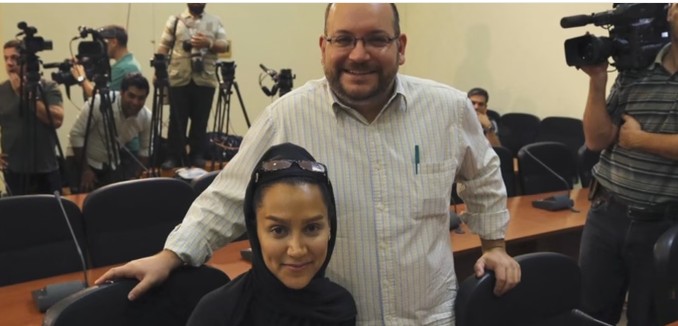The wife and mother of Washington Post reporter Jason Rezaian were seized by Iranian authorities and held incommunicado for hours before his release, nearly causing U.S. officials to cancel the deal to free Rezaian and four other American hostages held by the Islamic Republic, The New York Times reported Monday.
Rezaian was preparing to fly out of Tehran along with fellow dual American-Iranian citizens Amir Hekmati and Saeed Abedini when his wife, Yeganeh Salehi, and mother, Mary Rezaian, disappeared. They two were held for hours in a separate room at a Tehran airport with no means of contacting their families.
“They had disappeared,” said an anonymous American official. “Nobody could find them, and they were not answering phones. The Iranians then said there were legal issues that would prevent either from leaving the country.”
Iranian authorities tried to convince U.S. and Swiss officials, who were working together to secure the freedom of the American captives, to have the three depart without Rezaian’s mother or wife. Brett McGurk, the American in charge of the negotiations, refused and insisted that Rezaian’s family members be permitted to leave.
Secretary of State John Kerry then called Iranian Foreign Minister Mohammad Javad Zarif to request the release of Rezaian’ relatives, after which Kerry proceeded to hold a press conference in Vienna about the implementation of the nuclear deal. It took until midnight in Iran for the country’s prosecutor general to issue an order to release Rezaian’s wife and mother, and the two women were only allowed to head to the airport and leave the country eight hours later.
The deal that secured the eventual release of Rezaian, Abedini, Hekmati and two other U.S. citizens also freed seven Iranians or dual Iranian-American citizen who were indicted or imprisoned in the U.S. for sanctions-related offenses, and bound the U.S. to remove Interpol red notices for 14 Iranian nationals suspected of smuggling arms to the Islamic Republic.
Michael Rubin, a former Pentagon official and resident scholar at the American Enterprise Institute, wrote of the agreement that “we negotiated with terrorists, and the terrorists won.” Rubin pointed out that the history of engaging Iranians to negotiate the release American captives simply encourages more hostage-taking. During the administration of President Ronald Reagan, while Iran agreed to free American hostages in exchange for arms shipments, the moment the regime received the final weapons delivery, Iran-backed kidnappers seized three more Americans in Lebanon. “Simply put, the arms trade gave Iran an incentive to seize hostages,” Rubin argued.
In addition to encouraging Iran’s practice of capturing and imprisoning American citizens on politically-driven charges, the deal to release Rezaian and the other U.S. captives will likely strengthen Syrian dictator Bashar al-Assad, Josh Rogin reported Sunday for Bloomberg View. Canceling the Interpol red notices against Hamid Arabnejad and Gholamreza Mahmoudi, two executives with Iran’s privately owned Mahan Air, will make it easier for the airline to ferry arms and troops to Syria in support of Assad.
Rogin quoted Emanuele Ottolenghi, a senior fellow at the Foundation for Defense of Democracies, who explained how removing the red notice against Arabnejad and Mahmoudi will bolster Assad:
“The one big impediment for them to run their business abroad was the red notice, not the U.S. sanctions… Clearly it was not impossible for them to travel. The fact they are no longer on the red notice means that as long as they don’t try to come to the U.S., they will probably live their professional lives unencumbered.”
The lifting of the red notices also has a symbolic effect, he said, by telling countries and companies around the world that it’s OK to look the other way as Mahan Air helps the Assad regime and Hezbollah.
“These guys have been working day in and day out flying arms to Assad regime,” said Ottolenghi. “This is another signal that there will be no consequences for this airline and the crimes they are responsible for.”
While the Obama administration has insisted that the nuclear agreement with Iran and the release of American hostages were unrelated, Rogin reported that there are concerns in Congress that the White House is failing to confront Iran’s Islamic Revolutionary Guard Corps effectively in the wake of the nuclear deal. “This flawed deal is only entrenching Iran’s military and security forces that run the country,” House Foreign Affairs Committee Chairman Ed Royce (R – Calif.) said on Saturday.
In May, before global powers reached an agreement on Iran’s nuclear program, The Washington Post warned that its reporter’s treatment at the hands of Iranian authorities suggested that businesses seeking to establish commercial ties with Iran put their employees at risk of arbitrary arrest. After the nuclear deal was announced, the State Department warned that Americans visiting Iran were subject to detention and imprisonment on false charges.
An editorial published by the Post after Rezaian’s release warned that “in the absence of a firmer U.S. policy, Iran’s attacks on Americans and vital U.S. interests will surely continue.”
[Photo: Washington Post / YouTube ]




